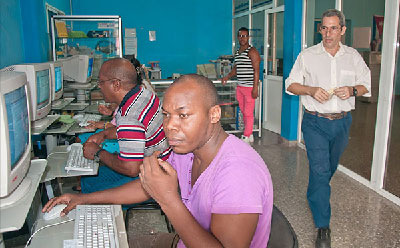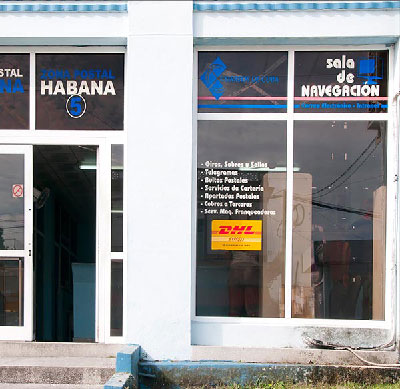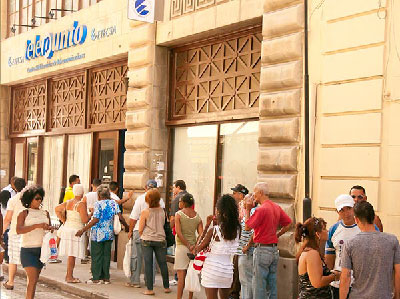This post is from the Havana Times, and is an authorized translation prepared by that site of an article that appeared in the BBC’s El Mundo.
A summary is the statistics is as follows:
In a country of over 11 million people, the new internet (mostly intranet) access will consist of:
- 1 cybercafe for every 65,000 people (assuming 8 million potential users).
- 334 computers for the entire country, operating 11 hours a day, for 3,674 hours of computer time, daily, for the entire nation.
- If only 10% of the population wants to get on-line, each individual will be able to do so once every six months.
- If 8 million of the 11+ million Cubans want to get on-line, each person will be able to do so once every 5 years.
- If one individual could connect for one hour a day, it would cost them $135/month (U.S.) — nearly 7 times their monthly wages (or more, for lower wage workers).
- All use will be monitored, and any user who violates the “norms” will be cut off. No politics, no sex.
- Revolico.com — Cuba’s “Craiglist” — is blocked.
- No one under 18 will be admitted. (Forget homework help, students.)
Cuba’s New Cybercafés: A Piecemeal Strategy

HAVANA TIMES — Next month, 118 public Internet access points will open across Cuba, something which Cubans, one would expect, ought to regard as rather good news. Though any step in the right direction should be applauded, it would be remiss not to gauge the real impact this measure will have on the island.
Supposing that there are 8 million young people and adults across Cuba who are interested in using the Internet, we would have one cybercafé for every 65 thousand people. You would see line-ups of people longer than those that would gather outside bodegas if they began handing out beef rations again.
With a total of 334 computer consoles around the country, the cybercafés will be open 11 hours a day. If every user were to navigate for only an hour, a mere 3,700 people would be able to access the Internet a day. If we maintain our initial figure of 8 million potential Internet users, people would get to connect once every 5 years.
Even if we assume I am exaggerating and that only 10% of this hypothetical population wants to use the Internet, each person would have access to the web only once every six months. And Cuba’s phone company, ETECSA, needed all of two years to take this bold step, from the date in which the installation of an underwater fiber-optic cable between Cuba and Venezuela was completed.
Though the company’s directives offer some hope, claiming that, “in the future”, they will attempt to expand their services to meet demands with Wi-Fi networks, Internet service for mobile phones and even homes, they play it safe and conclude by saying they “cannot give any specific dates.”

People, however, can do their own math. If, in the time since the sub-aquatic cable was installed, the capacities created can accommodate a mere 3,700 users a day, it will take centuries before all Cubans of age and deserving of Internet access have this privilege.
In addition to this, they have announced that rates will be lowered to US $5.00 (4.50 CUC) for every hour of Internet use, a price which proves affordable if one connects to the web once every six months, but which would entail spending US $135 a month if one wanted to do so, for 1 hour, at least once a day.
A Cuban’s average monthly salary is of US $20. Supposing that, in a given family, there are two people earning this salary and a couple of pensioners receiving US $10, plus a relative in Miami who sends them US $50 every month, they would have to devote the family’s entire income to pay the cybercafé bill.
The problem, apparently, is that ETECSA requires substantial sums of money, “significant investments”, to modernize the country’s technological infrastructure. It shouldn’t take long to put together such money, considering that, with these new cybercafés, they can take in US $16 thousand a day, some 6 million dollars a year.
Strict Rules on Users
In addition to being expensive, cybercafés will impose strict rules on users, and authorities will reserve the right to block the account of any individual who employs the web to carry out actions that “undermine public safety or the country’s integrity, economy, independence and sovereignty.”
ETECSA will also “immediately suspend the service if it detects that, during the navigation session, the user has violated any of the ethical norms of behavior which the Cuban State has established.”
In a nutshell, no politics and no sex. I imagine that the slogan of these cybercafés will be something along the lines of “A healthy Internet for the Cuban family.” A system of filters which block access to a number of ideologically or morally “offensive” sites is already in place.

Political censorship on the web is rather “tropical”: though some sites operated by Cubans living in Miami are blocked, the main newspaper of Cuban exiles can be freely accessed by cybernauts on the island. In the case of Spain, one anti-Castro page is blocked and another isn’t, though both publish pretty much the same information.
When it comes to moral matters, however, censors evince the puritanism of a small-town parish priest. In their crusade against pornography, they block new pages containing videos, photographs, contacts, stories or any kind of eroticism – literally nothing gets past them.
They are also particularly intolerant of any commercial use of the web. Cuba’s main classifieds page, Revolico.com, is blocked. There isn’t a single Internet user in Cuba, however, who does not know how to use a proxy to evade the official filters and access these ads.
The most surprising restriction, however, is that people under 18 will not be allowed to navigate the Internet at these cybercafés. It looks as though junior and senior secondary school students will have to cultivate a good deal of patience and wait until they reach university to get to know what the Internet is all about.
We would well be justified in describing Cuba’s current strategy for the expansion of Internet services, which leaders in the sector insist will lead to a luminous future of web connectivity, as a piecemeal tactic.
30 May 2013
